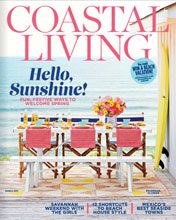So, it’s time to scale down, and we’re not talking swimsuit season! This is more than a few pounds. We’re talking getting rid of years of accumulated treasures.
This is not an easy project. When we lose weight, we don’t think: “That two lbs came from that wonderful weekend in New Hampshire when the kids were little,” or “I bought that fat-filled cheesecake with my first bonus.” We have an attachment to our possessions that is beyond our control. Just stiffen your upper lip and remind yourself that your mind can hold lots more memories than your condo can hold souvenirs. Are you ready for that first step?
Step 1: What do you actually need? Take time to picture the space you will be living in. Make a list of items you do need (i.e. four dining chairs, a desk, a tall side table for the bedroom). Now fill the list with items you could never part with.
Step 2: What do you actually like? Fill in around your bare bones needs with items that give you joy. Remember that you don’t want to over crowd, so be very careful with this step. Try keeping one item, to remember Aunt Sue, or your favorite thing from your first home. One item can trigger wonderful memories as wells as twenty. Decorator magazines suggest using collections of like items to accent your room. Maybe you could select fifteen teacups and let the other forty-seven in the collection go. The magazines also suggest using odd numbers to make displays of collections more interesting.
Step 3: Edit. After you’ve done steps one and two, you may still be looking for a place to set your glass of tea, or maybe even a seat for your husband (you’d probably better keep him). I suggest a team approach. Invite a friend to help you edit. Choose someone who has a home you find comfortable. Never choose a friend with more stuff than you, for obvious reasons. If this hurts your best friend’s feelings, gently explain your reason for choosing someone else, then offer to help him/her after overcoming your own addiction. As an appraiser, I get lots of calls at this point. People often find a little guidance in determining what they have, and what the values are, helps them choose what to keep. Remember, you don’t have to keep something you don’t really like because it’s valuable. I’m just suggesting that you keep the best fifteen of those forty-seven teacups. Actually, the fact that it is valuable is a great reason not to keep something you don't like. Why not get rid of it and make some money?!"
Now you have a sleeker looking home that you can enjoy without tripping or spending three days dusting. Wait, what’s that mountain of stuff in the garage? You will eventually have to get rid of the things that you don’t need or the kids don’t want. By the way, I’m talking about household items, not relatives (I don’t do that kind of work!).
As you pare down, remember that the old adage, “one person’s trash is another’s treasure” doesn’t always apply. Sometimes trash is trash! No one wants items that are beyond repair or even dangerous. An early 19th century chair with ripped upholstery is one thing but a lounge chair with a spring sticking out can, and should, go to the dump. Go ahead and throw away what is truly trash. By the way, don’t confuse the local charity drop off with the dump…that’s not nice!
Speaking of charities…clean, safe, and useable items are always welcome at a charity thrift store or donation center. It is a great feeling to know that the bunk beds you no longer need are going to be used by kids whose home burned. Many of these will also take clothing in good condition. Ask the organization for a receipt for the tax deduction you may take. The IRS allows a deduction equal to what the item actually sells for. You can determine this by asking what similar items sell for or waiting for your item to be sold at auction. An outrageous claim can create an audit red flag, so play fair.
Antiques, collectibles and other money makers can be sold or consigned. Visit the local shops and ask what items they are accepting. Don’t be insulted if they don’t take your items. They know what sells in their shop and they need to make a profit, not just let your stuff sit in the shop. Also remember that they will pay you less than the item sells for since they do have to make some money. Some antique and vintage items do have significant value. If an item will not sell well in your area consider a dealer or auction in another town or region. Again, talking to a dealer or an appraiser you trust is a good idea at this point.
Now that you have scaled down, you either have a little extra cash or that warm fuzzy feeling that comes from helping someone else with your donations. You even have spare time since you have less to clean around. Enjoy your extra space and free time…or call me and we’ll go to auction together.







